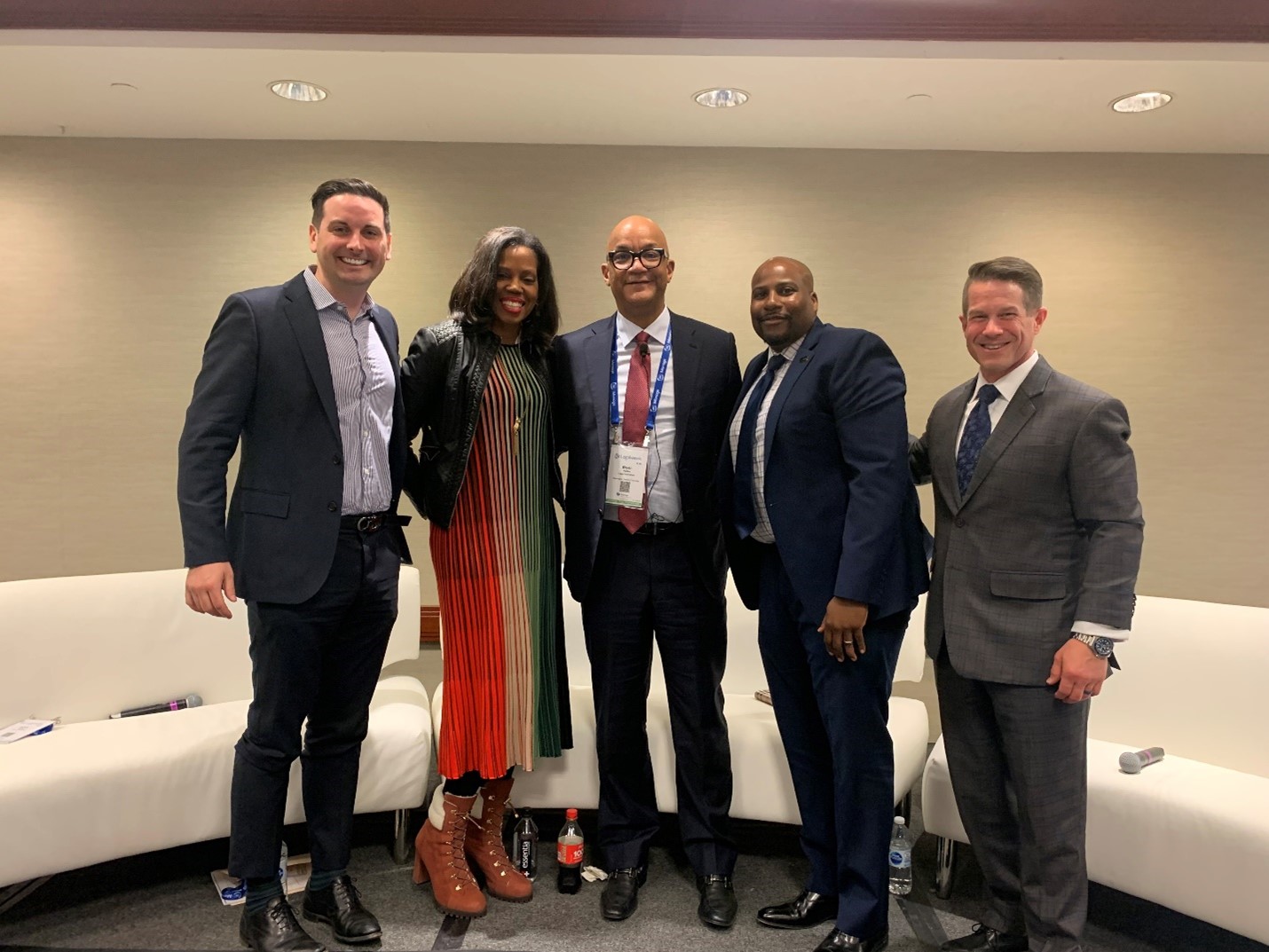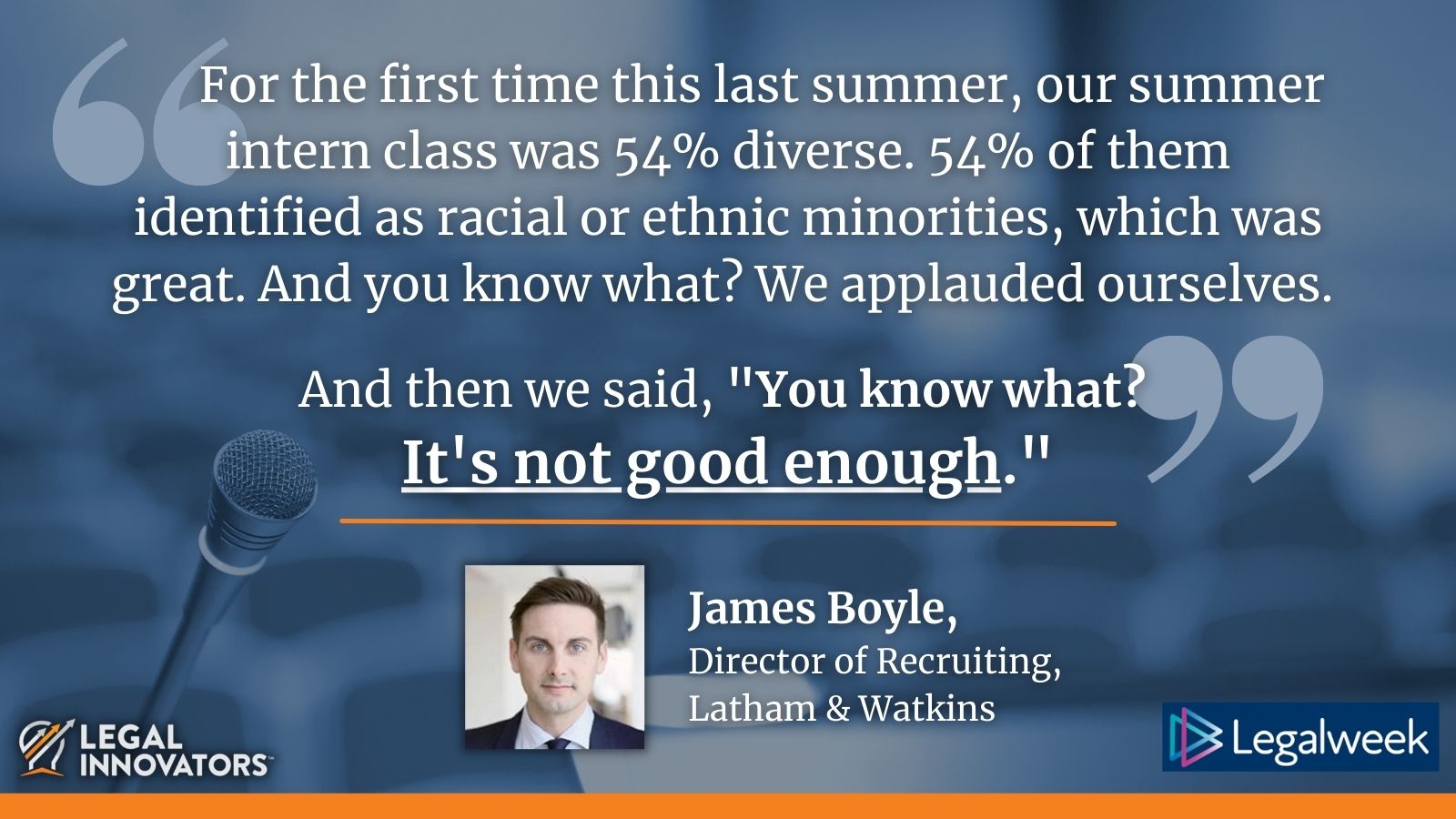LegalWeek in New York is an event where thousands of legal professionals gather to network, dive deeper into professional development, and explore topics and strategies specifically tailored to their unique roles with an emphasis on legal technology. LegalWeek provides insight into the changing legal landscape and how to tackle, rebuild, and reinvigorate law firms and legal departments.
Prioritizing Actionable DE&I Metrics That Matter: A Moment or a Movement?
Last week, Legal Innovators hosted a panel focused on diversity, equity, and inclusion (DEI) in the workplace and how using data and metrics can drive systemic change. The panel consisted of various stakeholders including:
- Kimberly Hulsey, Chief Diversity Officer, Locke Lord
- James Boyle, Director of Recruiting, Latham & Watkins LLP
- David Hubbard, VP & Deputy General Counsel, Verizon
- Darryl Cross, US Executive Sales Coach, Norton Rose Fulbright

From left to right: James Boyle, Kimberly Hulsey, Bryan Parker, David Hubbard, Darryl Cross
The conversation explored how developing a successful DEI strategy begins with data collection and determining the need for change. Moreover, panelists considered how to take an intentional approach to inclusivity at the leadership level and create an environment where underrepresented groups want to stay.
Important Roles of Law Firms and Corporations
DEI initiatives are the first step to creating more diverse, profitable, and creative workspaces, but it is not enough just to look at the numbers; understanding your company’s culture is important to creating lasting change. Panelist James Boyle highlighted how at Latham & Watkins he strives to be more than just a Recruiting Director. For example, he stated that he values his connection to the Associates Committee and the Diversity Leadership Committee because it is everyone’s responsibility to get involved in recruitment and retention. Similarly, Darryl Cross of Norton Rose Fulbright noted that his company has a JD introduction program for sixth to eighth graders in Houston. Norton Rose, like many companies, recognizes that involvement in local communities through outreach programs is a helpful way to form long-lasting connections. David Hubbard explained how companies can lead by requiring their law firms to adapt policies and staffing that are more inclusive.
How Are Metrics Used to Maintain Accountability?
In the months following the murder of George Floyd, corporations promised to recommit themselves to DEI initiatives. However, not every company maintained a system of accountability that allowed them to create lasting and tangible change. During the discussion, panelist Kimberly Hulsey made a pertinent point about the importance of businesses strategically choosing who to partner with in an effort to hold them accountable. For example, she discussed the Mansfield Rule, which measures whether law firms have affirmatively considered at least 30 percent women, lawyers of color, LGBTQ+ lawyers, and lawyers with disabilities for leadership and governance roles, equity partner promotions, formal client pitch opportunities, and senior lateral positions. Now the Mansfield Standard has the Inclusion Blueprint that is used to track DEI initiatives at firms, and if a firm is not upholding that standard, a company may decide to reevaluate an existing partnership.
The Mansfield Standard continued to grow and encourage firms and companies to strive for systemic change. At Norton Rose Fulbright, which is 4.0 certified, they are striving to do even more. Darryl Cross noted “that’s not quite good enough because now Mansfield 5.0 is there and that is achieving 70% of the milestones, and that’s what we’re currently working on right now.”
Metrics are not useful unless there is buy-in from the top down. James Boyle shared his experience proposing to double the amount of diversity scholarships and having the complete support from his Executive Committee. It’s crucial to have leadership focus and support all the different types of initiatives that can support DEI. He ended by saying, “We are doing everything that we possibly can in the moment, which hopefully when you add up all those moments, leads to the movement.”

Key Takeaways
Diversity, equity, and inclusion efforts do not stop at a magical number. Today, it is imperative that companies look for ways to recruit and retain underrepresented groups and create a supportive pipeline for career development. DEI initiatives can be successful when businesses ask questions like “what are the demographics of employees who are leaving and staying?” and “what are the demographics of employees getting flexible work assignments and bonuses?” Furthermore, it is important to ask whether an office’s culture of “professionalism” is ostracizing certain groups of people. A significant component of business development is instituting, altering, and studying which methods work and which methods do not. While there may be some resistance to prioritizing actionable DEI metrics, it is safe to say that it is a movement with increasing momentum.




